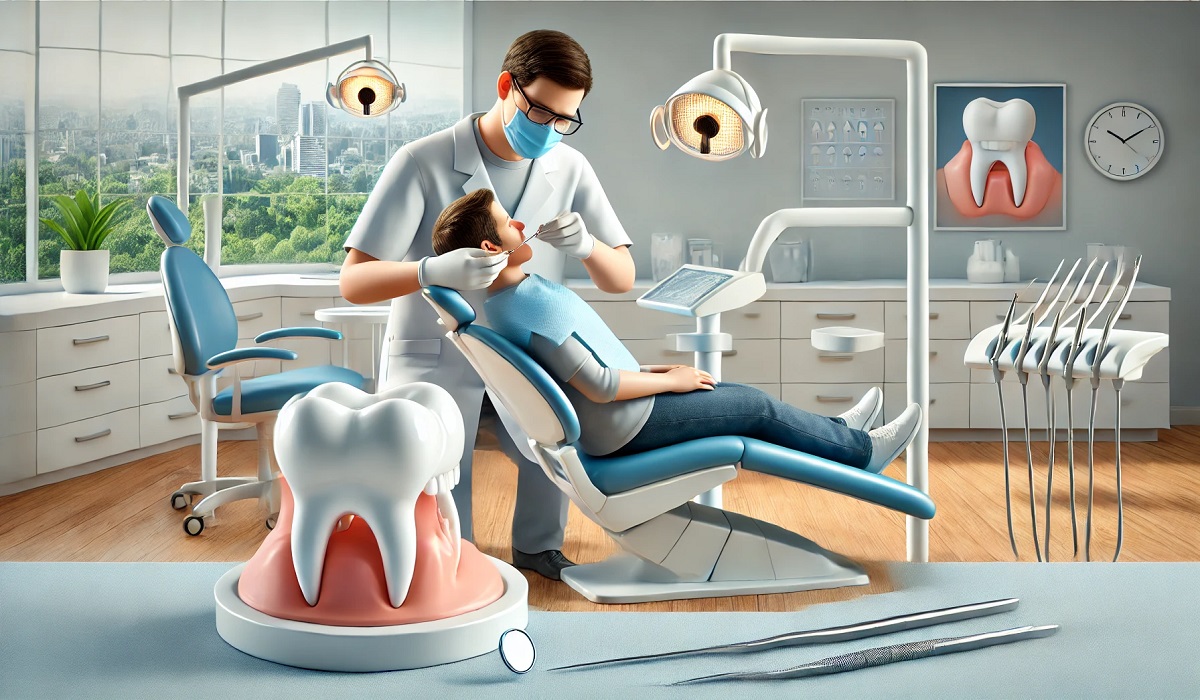HEALTH
Dental Crown Near Me: Find the Best Care Options

A dental crown can significantly restore both the function and appearance of a damaged tooth. If you are searching for a dental crown near me, you’re likely looking for high-quality, cost-effective dental services close to your location. Dental crowns play a crucial role in modern dentistry, offering a reliable solution for broken, decayed, or weakened teeth. This comprehensive guide explores everything about dental crowns, their types, procedures, benefits, and tips for finding the best dental care near you.
What Is a Dental Crown?
A dental crown is a tooth-shaped cap placed over a damaged or decayed tooth to restore its size, strength, shape, and overall appearance. It acts as a protective cover, ensuring the tooth is functional and aesthetically appealing.
Crowns are often recommended in the following situations:
- Protecting a weak tooth from further damage.
- Restoring a broken or worn-down tooth.
- Covering a large filling when minimal tooth structure remains.
- Supporting a dental bridge.
- Covering dental implants or severely discolored teeth.
These versatile dental restorations are an essential part of maintaining oral health and confidence in your smile.
Types of Dental Crowns to Choose From
When searching for a dental crown near me, it’s important to know the types of dental crowns available. The choice depends on your budget, aesthetics, and specific dental needs.
Porcelain Crowns
- Appearance: Natural-looking and aesthetically pleasing.
- Use: Commonly used for front teeth.
- Pros: Mimics the color of natural teeth.
Metal Crowns
- Materials: Made of gold, silver, or metal alloys.
- Durability: Extremely strong and long-lasting.
- Pros: Ideal for molars due to strength.
Porcelain-Fused-to-Metal (PFM) Crowns
- Combination: A mix of metal and porcelain for strength and aesthetics.
- Versatile Use: Suitable for both front and back teeth.
- Pros: Provides durability with a natural appearance.
Zirconia Crowns
- Material: Made from zirconium oxide.
- Strength: Highly durable and resistant to wear.
- Pros: Combines aesthetics with exceptional strength.
Resin Crowns
- Material: Made from composite resin.
- Cost: Affordable compared to other types.
- Cons: Less durable and prone to wear over time.
How to Find the Best Dental Crown Near Me
Finding a qualified and reliable dentist for your dental crown procedure requires careful consideration. Here are a few steps to help you locate the best dental care nearby:
- Research Local Dental Clinics
- Search online for dental clinics offering crown treatments.
- Check reviews on Google, Yelp, or dental directories.
- Verify Dentist Credentials
- Look for dentists with appropriate qualifications and experience.
- Ensure they specialize in restorative dentistry.
- Compare Costs and Services
- Request quotes from multiple clinics.
- Look for transparent pricing and financing options.
- Evaluate Dental Technology
- Choose clinics that use modern technology for accurate and quick treatments.
- CEREC technology allows same-day crowns for faster results.
- Ask for Recommendations
- Seek referrals from friends, family, or colleagues who have had dental crowns.
- Online forums or social media groups can also provide insights.
- Visit the Clinic
- Schedule a consultation to assess cleanliness, professionalism, and comfort.
- Discuss your treatment options, costs, and timeline.
By following these steps, you can ensure high-quality dental care tailored to your needs.
The Dental Crown Procedure: Step-by-Step Guide
Understanding the procedure for getting a dental crown can alleviate concerns and prepare you for the process.
Step 1: Examination and Preparation
- The dentist examines the tooth using X-rays to determine the extent of damage.
- The affected tooth is reshaped to make space for the crown.
Step 2: Impression Taking
- An impression of the prepared tooth is taken using a mold or digital scanner.
- This impression is sent to a dental lab to fabricate the crown.
Step 3: Temporary Crown Placement
- A temporary crown is placed to protect the tooth while the permanent crown is prepared.
Step 4: Permanent Crown Fitting
- Once the crown is ready, it is cemented onto the prepared tooth.
- Adjustments are made to ensure a perfect fit and bite alignment.
Step 5: Final Polishing
- The dentist polishes the crown to match the appearance of your natural teeth.
This straightforward procedure typically requires two visits unless same-day crowns are available.
Benefits of Getting a Dental Crown Near Me
Opting for a local dental crown treatment offers several advantages:
- Convenience: Easy access to consultations and follow-up appointments.
- Faster Treatment: Reduced travel time ensures a quicker resolution.
- Personalized Care: Local dentists often build long-term relationships with their patients.
- Cost Savings: Competitive local pricing can make treatments affordable.
- Emergency Services: Quick access in case of crown damage or discomfort.
Cost of a Dental Crown Near Me
The cost of dental crowns varies depending on the material, dentist, and location. Here is a general estimate for different types of crowns:
| Type of Crown | Average Cost |
|---|---|
| Porcelain Crowns | $800–$2,500 |
| Metal Crowns | $900–$1,500 |
| PFM Crowns | $850–$1,800 |
| Zirconia Crowns | $1,000–$3,000 |
| Resin Crowns | $500–$1,200 |
Factors Influencing Cost:
- Dentist experience and location.
- Materials used.
- Insurance coverage.
- Additional procedures like root canals.
Many dental clinics offer flexible payment plans to make treatments more affordable.
Tips for Maintaining Your Dental Crown
A dental crown can last up to 15 years or more with proper care. Follow these maintenance tips to extend its lifespan:
- Brush twice daily using a soft-bristle toothbrush.
- Floss regularly to prevent plaque buildup around the crown.
- Avoid chewing hard foods or using teeth to open objects.
- Schedule routine dental checkups for monitoring and cleaning.
- Wear a night guard if you grind your teeth while sleeping.
By incorporating these habits into your daily routine, you can ensure the longevity of your dental crown.
Conclusion
Searching for a dental crown near me can lead you to experienced professionals who provide top-notch restorative dental care. Dental crowns offer a long-term solution for damaged or decayed teeth, enhancing both functionality and aesthetics. By understanding the types of crowns, the procedure, and maintenance tips, you can make an informed decision to protect your smile. Take the time to research and find a reputable dental clinic nearby to ensure quality care, comfort, and lasting results.
FAQs
How long does it take to get a dental crown?
The process typically takes two visits, but same-day crowns can be completed in a single appointment.
Is the dental crown procedure painful?
The procedure is performed under local anesthesia, ensuring minimal discomfort.
What is the lifespan of a dental crown?
With proper care, dental crowns can last 10–15 years or longer.
Are dental crowns covered by insurance?
Most insurance plans cover part of the cost, depending on the material and reason for the crown.
Can I eat normally after getting a dental crown?
Yes, but it’s advisable to avoid hard or sticky foods for the first 24 hours.
What happens if my dental crown falls off?
Contact your dentist immediately for repair or replacement. Avoid chewing on the affected side.

 BUSINESS8 months ago
BUSINESS8 months agoService Top: Understanding Role, Dynamics, and Consent in Relationships

 TECHNOLOGY7 months ago
TECHNOLOGY7 months agoSSIS 858: Everything You Need to Know

 GUIDE6 months ago
GUIDE6 months agoLookmovie2.to Legit: A Detailed Review of Safety and Features

 FASHION7 months ago
FASHION7 months agoDIY Tips to Customize Your Orange Prom Dress and Stand Out

 GUIDE6 months ago
GUIDE6 months agoTokybook: Your Gateway to the World of Audiobooks

 TECHNOLOGY7 months ago
TECHNOLOGY7 months agoUnderstanding Libgen: The Ultimate Free Ebook Library

 GUIDE8 months ago
GUIDE8 months agoLeague of Graphs: The Ultimate Guide to League of Legends Stats and Analysis

 GUIDE7 months ago
GUIDE7 months agoLook at All Those Chickens: The Story Behind the Viral Meme
















